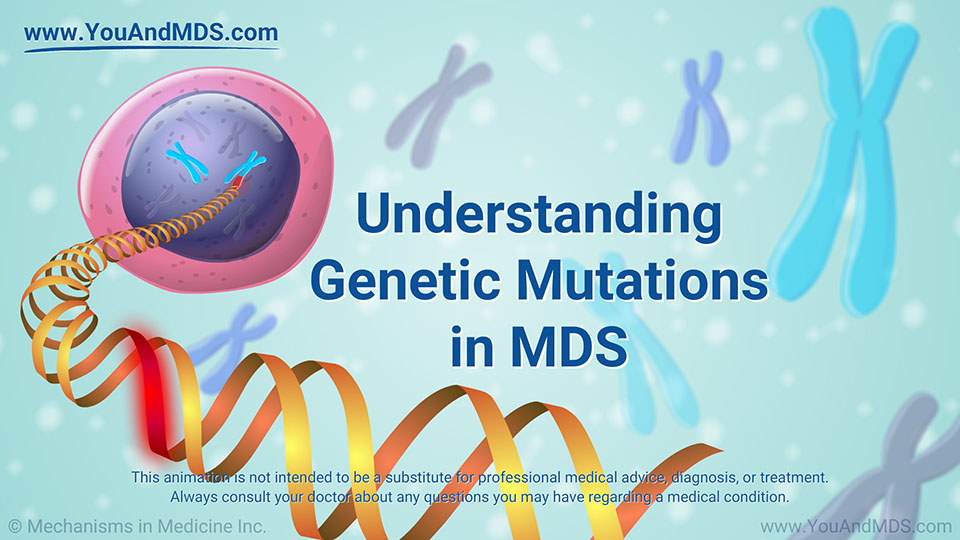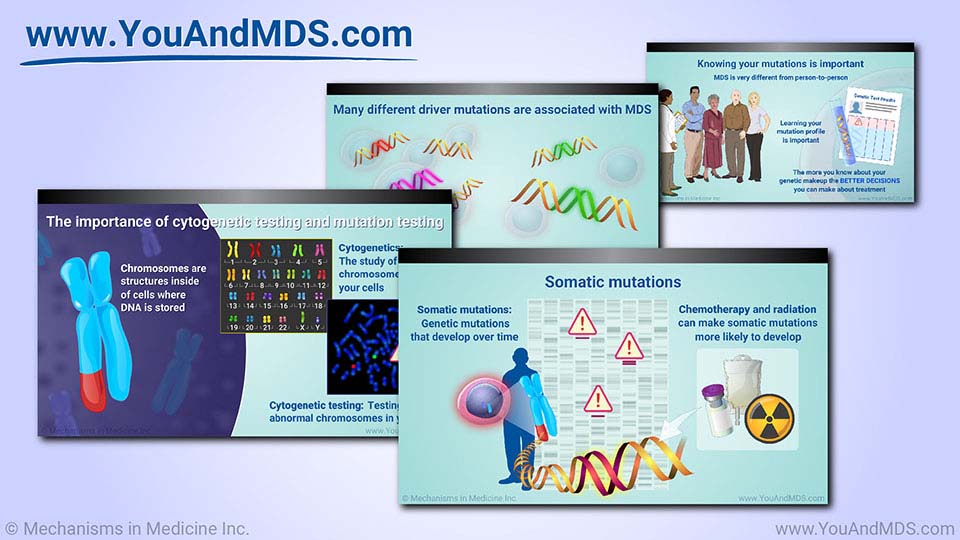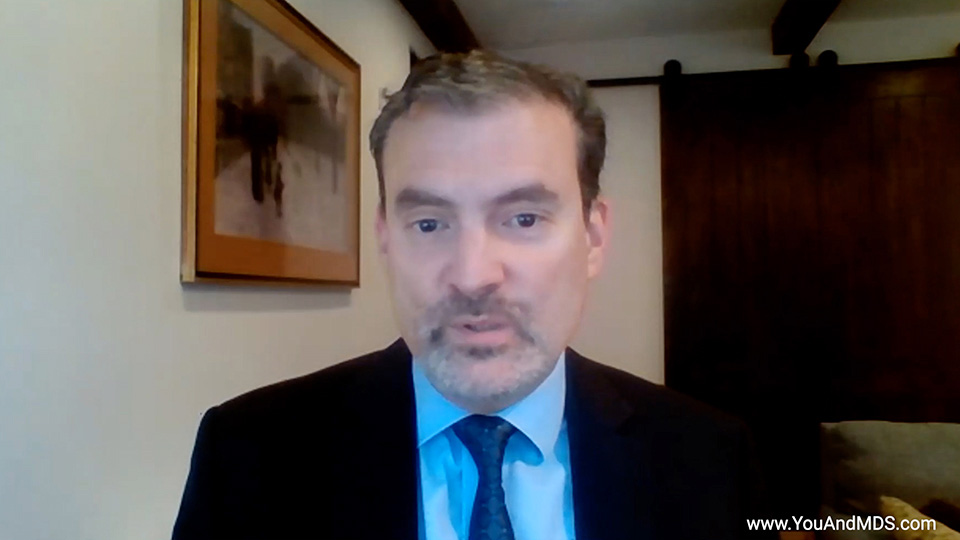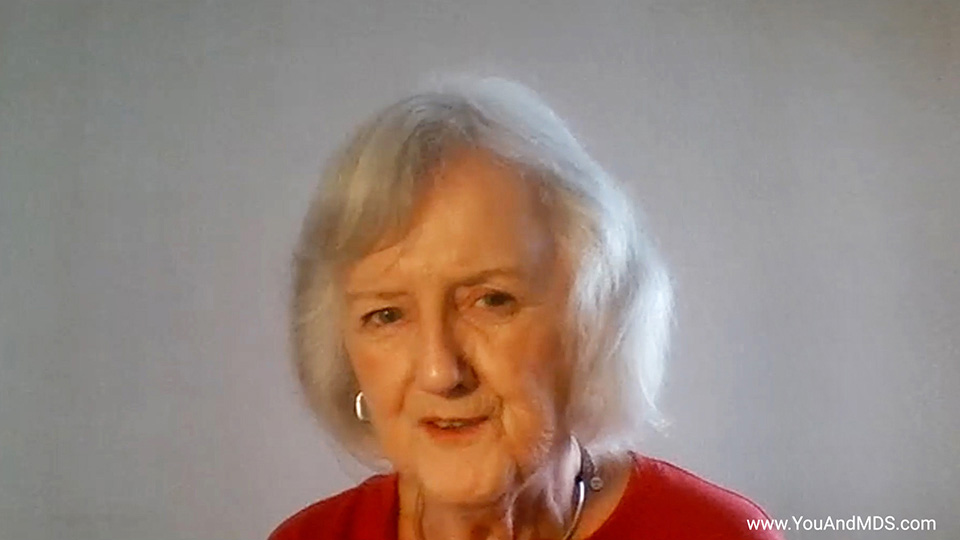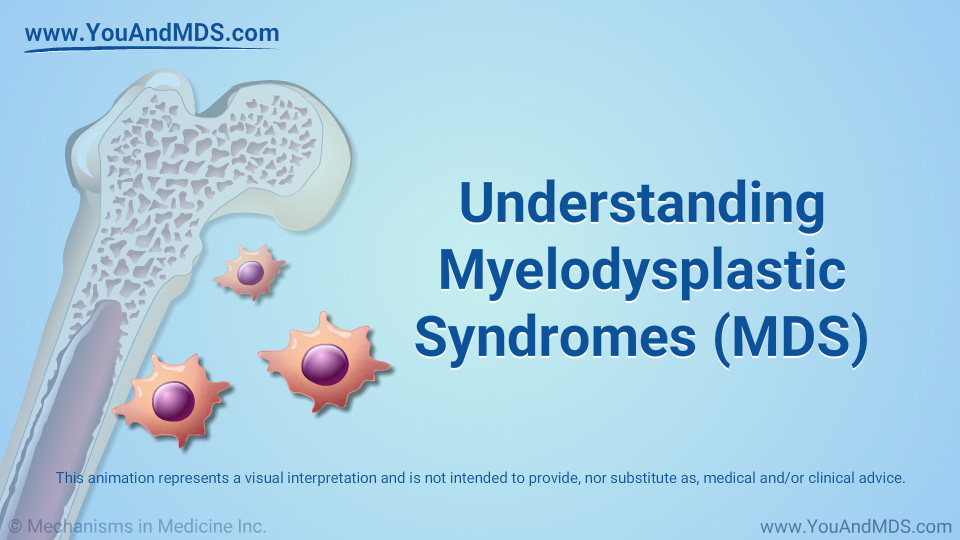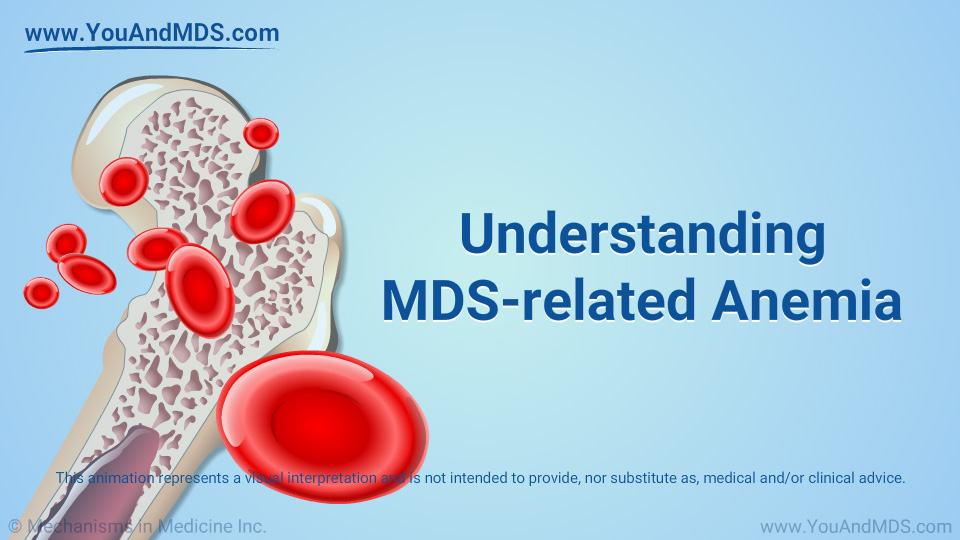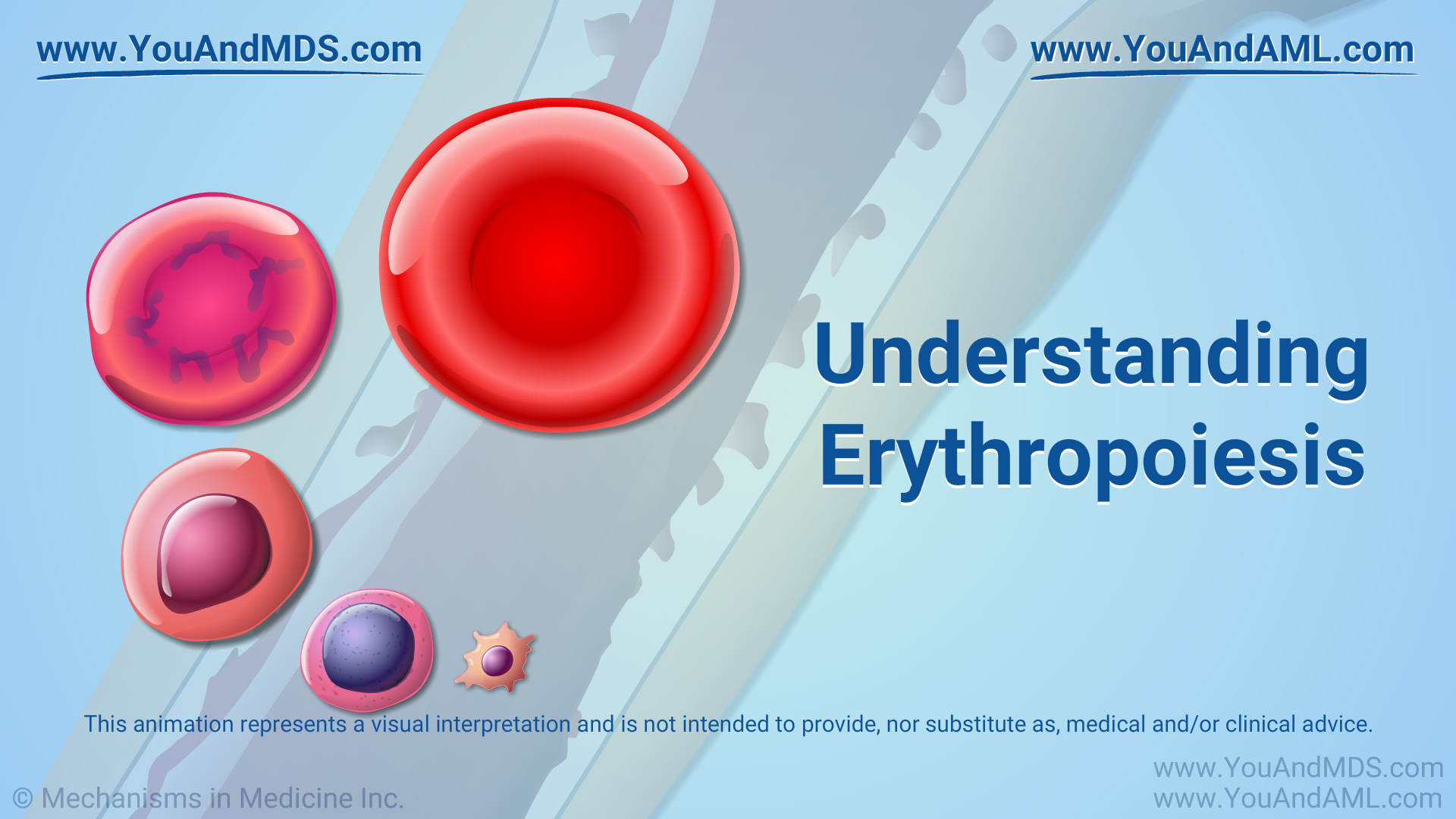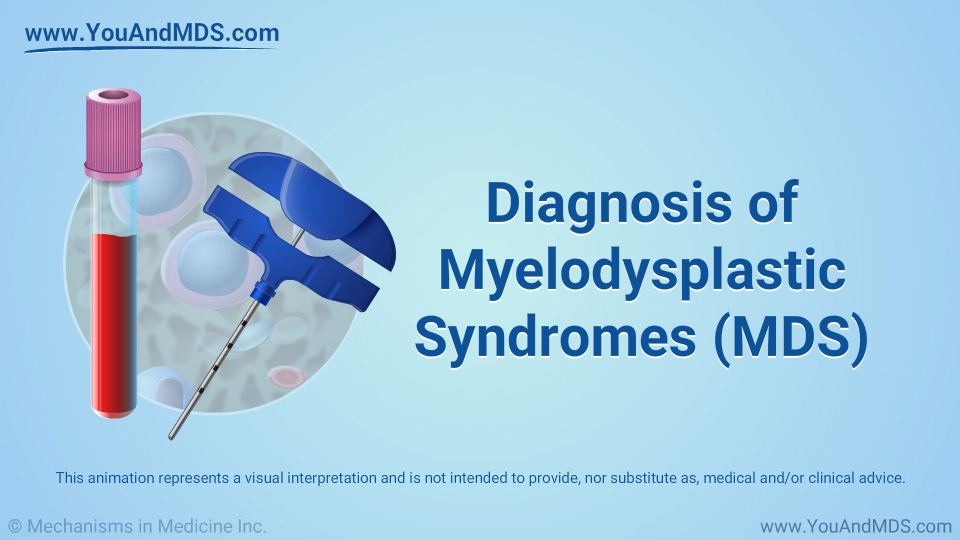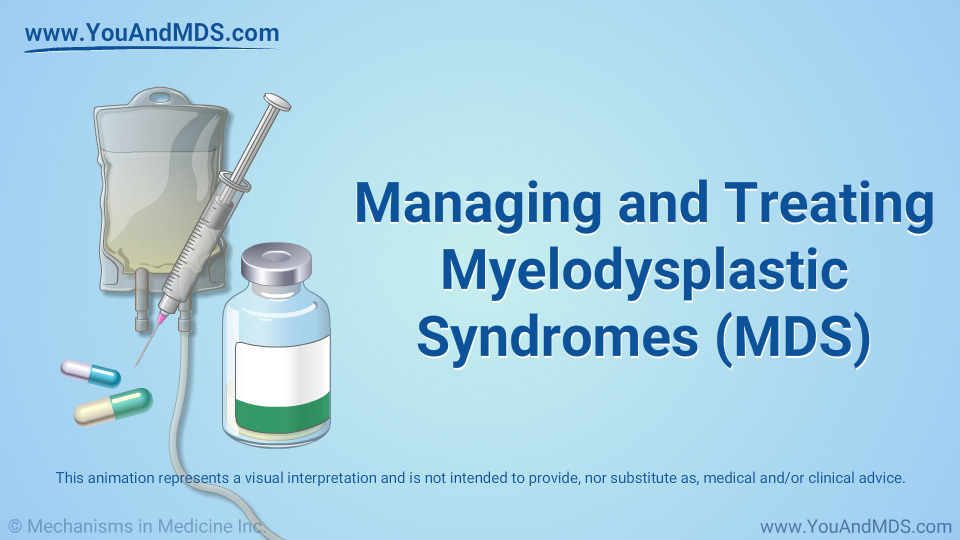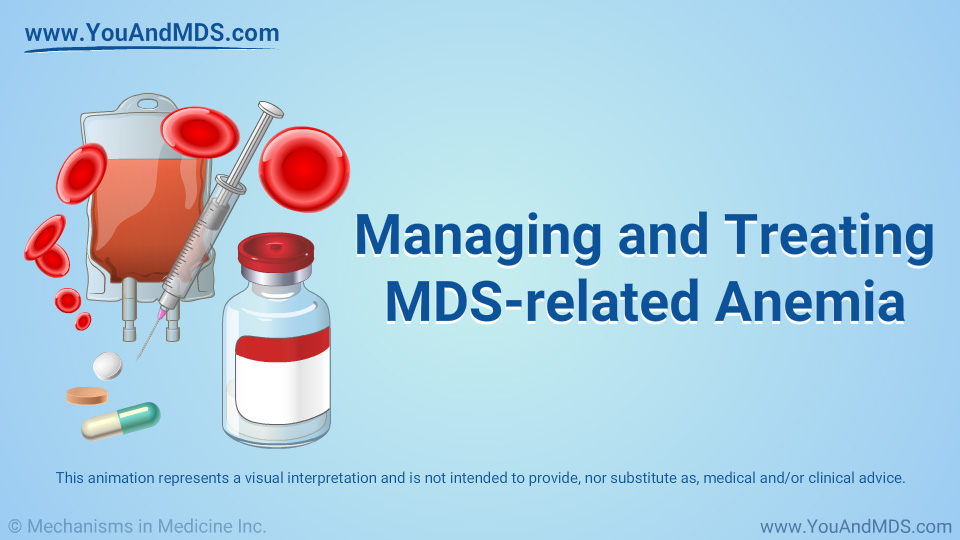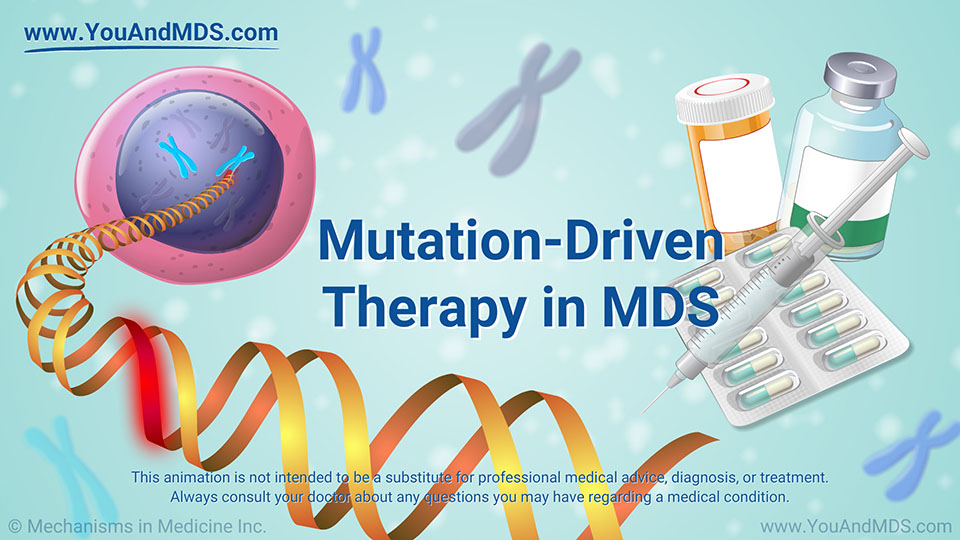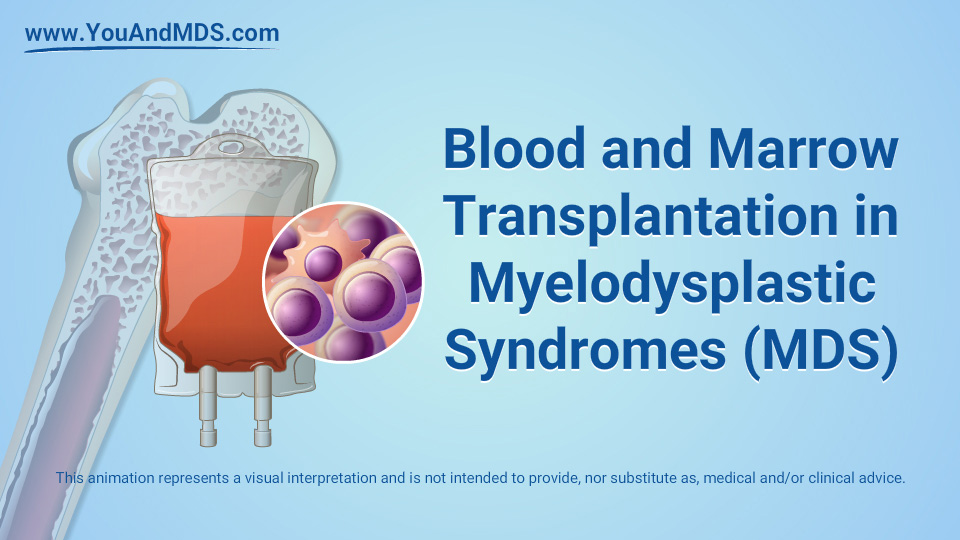Understanding Genetic Mutations in MDS
*Please note: This slide show is not intended to be a substitute for professional medical advice, diagnosis, or treatment. Always consult your doctor about any questions you may have regarding a medical condition.
What is MDS?
MDS stands for "myelodysplastic syndromes." It is the name of a group of bone marrow failure disorders.
What is MDS?
In these disorders, the bone marrow does not produce enough healthy blood cells.
What is MDS?
Experts consider MDS a form of blood cancer. About 1 in 3 people with MDS eventually develops acute myeloid leukemia, or AML.1
What are the causes of MDS?
MDS happens when something affects the cells in your bone marrow, where blood cells are made, that prevents them from continuing to make healthy cells.
In some cases, the cause is DNA damage from exposure to toxic chemicals or chemotherapy for a previous cancer.2 In other cases, the cause is a genetic mutation that arises as the bone marrow cells replicate over and over. This is associated with older age.
Genetic changes and MDS
Genes are small segments of DNA that provide the instructions for making new cells. A mutation in a gene changes these instructions, so the new cells are abnormal.3
The cells keep reproducing, just as healthy cells do. But in this case, they make more abnormal cells.3 Eventually, this leads to a lack of healthy cells.
Somatic mutations
The genetic mutations that develop in our cells over time are called somatic mutations. They are an important cause of all forms of MDS.
Chemotherapy and radiation can make somatic mutations more likely to develop.1
Somatic mutations
A somatic mutation is not a mutation that a person with MDS was born with. It is a mutation that appeared in an abnormal blood cell and is not found in other cells in the body.
You do not inherit somatic mutations from your parents, and you cannot pass them to your children.
Driver mutations
Some mutations promote, or "drive", cancer development. Experts call these "driver mutations".
Many different driver mutations are associated with MDS
Researchers have identified many different driver mutations associated with MDS. Most people with MDS have 2 to 4 of these, plus many others that do not promote cancer development. These others are called "passenger" or "background" mutations.4
Mutations and MDS outlook
Some mutations found in MDS are associated with lower-risk disease.2 For example, people with a mutation in a gene called SF3B1 in MDS usually have a relatively good outlook, or prognosis.5 Other mutations are associated with a poorer outlook.
Learning about your mutations in MDS
Knowing what mutations, and how many, you have can help you and your doctor understand your outlook, including how you will respond to certain drugs or a bone marrow (stem cell) transplant. This can help you make treatment decisions.
The importance of cytogenetic testing and mutation testing
Chromosomes are structures inside of cells where DNA is stored. They can be abnormal in nearly half of patients with MDS.
The study of chromosomes in your cells is called cytogenetics. Testing for abnormal chromosomes in your cells is called cytogenetic testing. This is a standard part of an MDS evaluation.
The importance of cytogenetic testing and mutation testing
The testing is done by examining cells from a blood or bone marrow sample.
Mutation testing looks for mutations in individual genes. This is done with a technique called next generation sequencing, or NGS.
If you are diagnosed with MDS, it is a good idea to ask for mutation testing if your doctor does not order it.
More about genetic testing and where to find it
Genetic mutation tests help confirm that MDS is what you have. It also provides information about your type of MDS, also called your subtype. The pattern of mutations is called your mutation profile.6
In the United States, many health centers have MDS Centers of Excellence. These centers offer the latest information on cytogenetic and genetic mutation testing and interpretation. You can find these centers at mds-foundation.org.
How often should I have genetic testing?
Your mutation profile can change over time. So, it is important to repeat the testing at different stages of your treatment. For example, you may have it done when you are first diagnosed.
You can also have it done if the MDS gets worse or comes back after treatment, called a recurrence.7
If I have mutations, did they come from my parents?
MDS is rarely inherited. It is unusual to find two people with MDS in the same family.1
Mutations passed down from a parent are called germline mutations.3 They are rare with MDS but can occur, so tell your doctor if there is a family history of MDS or other blood disorders.
Knowing your mutations is important
MDS is very different from person to person,8 so learning your mutation profile is important.
The more you know about your genetic makeup in MDS, the more you will understand about the outlook and in some cases, the treatment that is most likely to be effective.
References
- The Myelodysplastic Syndromes Foundation. What is MDS? Accessed March 4, 2022. https://www.mds-foundation.org/what-is-mds/
-
American Cancer Society. Myelodysplastic syndromes. Causes, risk factors, and prevention. Accessed March 4, 2022.
https://www.cancer.org/cancer/myelodysplastic-syndrome/causes-risks-prevention.html
-
National Human Genome Research Institute. Mutation. Accessed March 4, 2022.
https://www.genome.gov/genetics-glossary/Mutation
-
Ogawa S. Genetics of MDS. Blood. 2019;133(10):1049-1059.
https://ashpublications.org/blood/article/133/10/1049/272730/Genetics-of-MDS
-
Malcovati L, Stevenson K, Papaemmanuil E, et al. SF3B1-mutant MDS as a distinct disease subtype: a proposal from the International Working Group for the Prognosis of MDS. Blood. 2020;136(2):157-170.
https://ashpublications.org/blood/article/136/2/157/454668/SF3B1-mutant-MDS-as-a-distinct-disease-subtype-a
-
The Myelodysplastic Syndromes Foundation. Understanding your MDS: Know your score, your subtype, and your mutation. [PDF]
https://www.mds-foundation.org
-
Cancer.Net. Myelodysplastic syndromes – MDS: Subtypes and classification. Updated December 2017. Accessed March 3, 2022.
https://www.cancer.net/cancer-types/myelodysplastic-syndromes-mds/subtypes-and-classification
-
Chiereghin C, Travaglino E, Zampini M, et al. The genetics of myelodysplastic syndromes: Clinical relevance. Genes (Basel). 2021;12(8):1144.
https://www.mdpi.com/2073-4425/12/8/1144
Knowing what mutations you have can help you and your doctor understand how you are likely to be affected by your MDS, including how you will respond to certain treatments. Scroll through to learn about
genetic changes in myelodysplastic syndromes (
MDS), and the many
different driver mutations that are associated with MDS. Some mutated genes are associated with
lower-risk disease, while others may indicate
greater risk. Your
mutation profile can change over time so it is important to
repeat the testing at different stages of your treatment. The more you know about your genetic makeup in MDS, the more you will understand the outlook and in some cases, the treatment that is most likely to be effective.
-
Share with family and friends:
Click here to take our SURVEY
Your feedback is important to us! We will use your feedback to develop future areas of content about MDS which will help other patients, caregivers and families.
